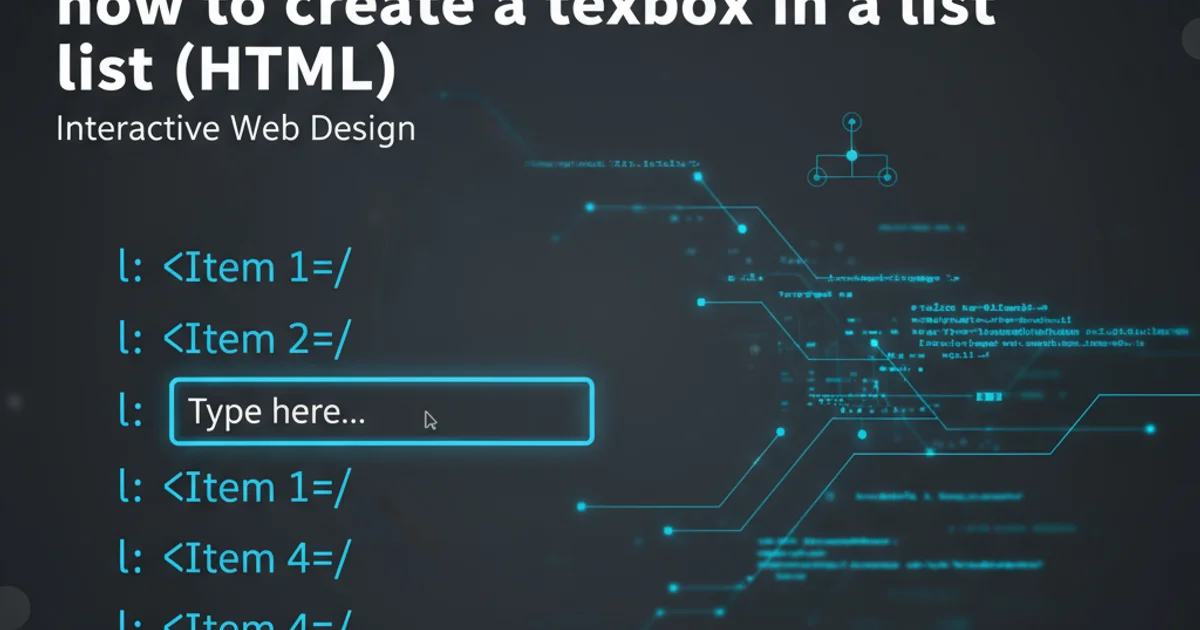how to create a textbox in a list (HTML)
Categories:
How to Embed Textboxes within HTML Lists for Interactive Content

Learn various methods to integrate interactive text input fields directly into HTML list items, enhancing user engagement and data collection within structured lists.
Embedding textboxes within HTML lists can be a powerful way to create interactive forms, checklists, or dynamic content where users need to input information directly alongside list items. While HTML lists (<ul>, <ol>) are primarily for displaying structured content, modern web development allows for flexible integration of form elements like <input type="text"> within them. This article explores different approaches, from basic HTML to more dynamic JavaScript-driven solutions, to achieve this functionality.
Basic HTML Integration
The simplest way to place a textbox inside a list item is to directly embed the <input> tag within an <li> element. This approach is straightforward and works well for static lists where the input fields are always present. You can style these inputs using CSS to match your design.
<ul>
<li>Item 1: <input type="text" placeholder="Enter value for Item 1"></li>
<li>Item 2: <input type="text" placeholder="Enter value for Item 2"></li>
<li>Item 3: <input type="text" placeholder="Enter value for Item 3"></li>
</ul>
Basic HTML structure for embedding textboxes in a list.
<label> element, even if the label is visually hidden. This can be done by wrapping the text and input in a label, or using the for attribute with an id.Dynamic List Items with JavaScript
For more interactive scenarios, such as adding new list items with textboxes dynamically, JavaScript is essential. This allows users to add or remove input fields as needed, creating a more flexible user experience. We'll demonstrate how to create a new list item and append an input field to it using JavaScript.
flowchart TD
A[User Clicks "Add Item"] --> B{Create new `<li>` element}
B --> C{Create new `<input type="text">` element}
C --> D{Append `<input>` to `<li>`}
D --> E{Append `<li>` to `<ul>`}
E --> F[Update UI]Flowchart for dynamically adding a list item with a textbox using JavaScript.
<ul id="dynamicList">
<li>Existing Item: <input type="text" placeholder="Initial value"></li>
</ul>
<button id="addItemBtn">Add New Item</button>
<script>
document.getElementById('addItemBtn').addEventListener('click', function() {
const list = document.getElementById('dynamicList');
const newItem = document.createElement('li');
const newTextInput = document.createElement('input');
newTextInput.type = 'text';
newTextInput.placeholder = 'New item value';
newItem.textContent = 'New Item: ';
newItem.appendChild(newTextInput);
list.appendChild(newItem);
});
</script>
JavaScript code to dynamically add list items with embedded textboxes.
Styling and Layout Considerations
While embedding textboxes is functionally straightforward, ensuring they look good and maintain proper layout within a list requires CSS. You might want to align the textboxes, control their width, or add spacing. Using Flexbox or Grid on the <li> elements can provide robust layout control.
ul {
list-style: none;
padding: 0;
}
li {
display: flex;
align-items: center;
margin-bottom: 8px;
}
li input[type="text"] {
flex-grow: 1;
margin-left: 10px;
padding: 5px;
border: 1px solid #ccc;
border-radius: 4px;
}
CSS to style list items and embedded textboxes for better alignment and appearance.